Nurses face significant change and challenges
Programs 219, 220, 240, 241 • 2 hrs
CDs available via special order. HumanMedia ®
Also available on our Podcast
Programs 219, 220, 240, 241 • 2 hrs
CDs available via special order. HumanMedia ®
Also available on our Podcast
 With six nurses for every physician, nursing is the heart of American health care. But even for these devoted professionals, the pandemic is a trying time. COVID-19 and its variants are testing our medical system — and personnel — as never before in living memory. Nurses spend the most time with patients and are typically very dedicated. They entered their profession primarily to care for people. Yet nurses face significant change and challenge in today’s medical environment. In this special series, you’ll hear the voices and perspectives of nurses in different regions and a variety of clinical settings.
With six nurses for every physician, nursing is the heart of American health care. But even for these devoted professionals, the pandemic is a trying time. COVID-19 and its variants are testing our medical system — and personnel — as never before in living memory. Nurses spend the most time with patients and are typically very dedicated. They entered their profession primarily to care for people. Yet nurses face significant change and challenge in today’s medical environment. In this special series, you’ll hear the voices and perspectives of nurses in different regions and a variety of clinical settings.
Part 1 takes a no-holds-barred look at the stressful conditions in which many nurses work: the long hours, the emotional toll, the rapid pace, and the way that technology and institutional practices can make it hard to form a caring bond with patients.
Part 2 presents inspiring stories of how active nurses use self-care techniques that help them manage, and transcend, the stresses of their essential work life, both on the job and after hours.
Part 3 asks how nurses, who are exposed to continual suffering by patients, manage to keep their hearts open and maintain compassion. Nurses describe the centrality of communication with patients and the skills of “active listening.” Nurses are regenerated by the bond of caring they build with patients in need.
Part 4 explores the very human level at which some nurses interact with patients at their most vulnerable moments. What spiritual questions about life and death arise in such encounters? We do nurses turn for their own support? And we look at the concept of “compassion fatigue” and ways nurses can maintain open-hearted care.
A real-world glimpse into the pressures on contemporary nurses
While the majority of nurses report satisfaction with their careers, at times it is a very heavy lift. Work shifts often run twelve to thirteen hours. This prompted the American Nurses Association to issue a position statement in 2014 about the consequences of nurse fatigue. It cited risk for medical errors and reduced job performance as well as drowsy driving on the way home.
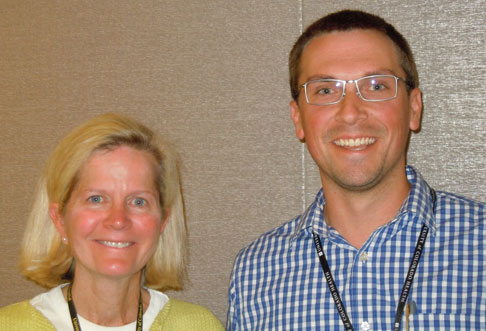
Rev. Julie Swaney (L) and Rev. Lucas Novak (R), Chaplains at Children’s Hospital Colorado
Other causes of stress for nurses include increasing patient loads, requirements to fill out numerous health care documents, a seemingly endless list of medications to keep track of and interpersonal tensions among staff. Nurses also must cope with emotions that arise when patients die and with the pervasiveness of medical technology—which can make it harder to establish a personal rapport with patients.
We hear nurses’ stories about the challenge of providing quality care under normal circumstances, and especially when a hospital must suddenly rise to the occasion of a major community crisis.
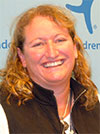 You think that this is your calling, and your career. And then you get into it, and it’s much different than it appears. It’s much more emotionally draining, and physically hard. And you have to try and navigate and figure that out.”
You think that this is your calling, and your career. And then you get into it, and it’s much different than it appears. It’s much more emotionally draining, and physically hard. And you have to try and navigate and figure that out.”
—Chris Griffin, Nurse educator on the pulmonary unit at Children’s Hospital Colorado
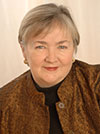 If somebody is tired, or if somebody’s on autopilot, I think it does increase the potential for errors, but it also increases the likelihood that that nurse is not going to be able to reach out and be, perhaps, as caring to the patient as is desirable.”
If somebody is tired, or if somebody’s on autopilot, I think it does increase the potential for errors, but it also increases the likelihood that that nurse is not going to be able to reach out and be, perhaps, as caring to the patient as is desirable.”
—Mary Jo Kreitzer, University of Minnesota nursing professor and Director of the Center for Spirituality and Healing
Techniques that help nurses stay calm and clear in a hectic worklife
Demanding and sometimes nerve-racking circumstances are a natural part of life and inevitably occur in the health care environment, where patients often arrive when they are in trouble. While it would be easy to get overwhelmed, skilled health care professionals have developed techniques for handling both everyday stresses and situations of unusual strain.
In this segment, we hear the fascinating stories of nurses in various locales who use practices for coping with these common challenges. In some cases, nurses rely on daily individual disciplines that help to keep them grounded even amid difficult moments. We also hear how group settings, like the Healing Services unit at the world-famous Cleveland Clinic, can provide relief not only for patients, but also for staff.
You’ll hear various effective techniques that are both interesting to learn about and potentially quite inspiring.
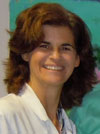 You get your schedule, and see how many patients you’re going to see, and your day starts to get a little harried. And I’ll just pause, and I’ll think to myself, “I am just grateful. I’m just grateful that I’m here, and in the presence of wonderful people.” Thinking of that throughout the day really helps me.”
You get your schedule, and see how many patients you’re going to see, and your day starts to get a little harried. And I’ll just pause, and I’ll think to myself, “I am just grateful. I’m just grateful that I’m here, and in the presence of wonderful people.” Thinking of that throughout the day really helps me.”
—Rose Hosler, Board-certified holistic nurse and reiki practitioner, Cleveland Clinic
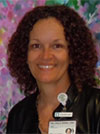 In the time it takes you to wait in line for a cup of coffee… if you sat down somewhere in a quiet room, and shut the door, it actually would take you less time than getting more caffeine in your system. You could be quiet for five minutes, and really recharge your batteries in a way that more stimulation won’t.”
In the time it takes you to wait in line for a cup of coffee… if you sat down somewhere in a quiet room, and shut the door, it actually would take you less time than getting more caffeine in your system. You could be quiet for five minutes, and really recharge your batteries in a way that more stimulation won’t.”
—Rev. Amy Greene, Director of Spiritual Care, Cleveland Clinic
 You have to take time for yourself. You have to have some kind of practice; whether it’s meditation, whether it’s prayer, whether it’s nature, whether it’s journaling, whether it’s poetry, art, literature. You have to learn to pause to reconnect with yourself and your source.”
You have to take time for yourself. You have to have some kind of practice; whether it’s meditation, whether it’s prayer, whether it’s nature, whether it’s journaling, whether it’s poetry, art, literature. You have to learn to pause to reconnect with yourself and your source.”
—Jean Watson, Dean Emeritus, University of Colorado School of Nursing
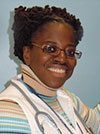 When I arrive at work, I try and arrive early so I can read my Bible. And it’s not that I’m hyper-religious, or anything, but that’s just part of my morning process of quieting my day before it even starts, and setting the tone. I find that it just leaves me open. I’m not going to cast judgment.”
When I arrive at work, I try and arrive early so I can read my Bible. And it’s not that I’m hyper-religious, or anything, but that’s just part of my morning process of quieting my day before it even starts, and setting the tone. I find that it just leaves me open. I’m not going to cast judgment.”
—Marion Tinsley, Nurse at VA Hospital, Jamaica Plain, MA
 What is causing the suffering in nurses? Sometimes we want to reduce that to a phenomenon called compassion fatigue. But you know what? It’s the opposite of that. It’s that nurses are working in systems that keep them from having these moments with [patients]—a caring occasion, a moment where two people see each other, and meet in a place that is beyond time and space.”
What is causing the suffering in nurses? Sometimes we want to reduce that to a phenomenon called compassion fatigue. But you know what? It’s the opposite of that. It’s that nurses are working in systems that keep them from having these moments with [patients]—a caring occasion, a moment where two people see each other, and meet in a place that is beyond time and space.”
—Janet Quinn, PhD nurse and founder of HaelanWorks, Lyons, CO
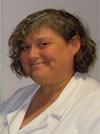 My brand of holistic care is that the healing goes both ways. So as I’m putting out that healing energy, I’m also filling myself up, so I don’t get depleted. Not taking away from what I’m doing with the patient, but adding to what I’m gaining from that.”
My brand of holistic care is that the healing goes both ways. So as I’m putting out that healing energy, I’m also filling myself up, so I don’t get depleted. Not taking away from what I’m doing with the patient, but adding to what I’m gaining from that.”
—Karen Fink, Board-certified holistic nurse and massage therapist, Cleveland Clinic
How nurses keep their hearts open in the face of patient suffering
In a health care setting, where serious illness may be on the line, what does it mean for a provider to listen attentively? We examine this core nursing practice in several venues.
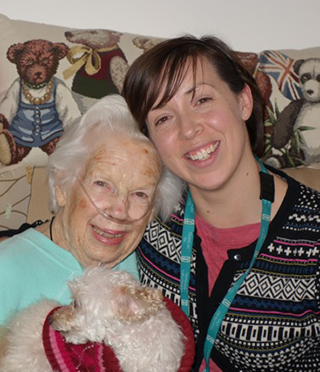
Nurse Amy Munankarmi (R) with patient Evie Webber(L)
First, the itinerant life of visiting nurses. They may see six patients per day—not in a hectic clinic but in the patient’s home. These nurses might spend up to an hour one-on-one, hearing out the patient, diagnosing and treating medical symptoms, learning about family relations. David accompanies Amy Munankarmi, of Home Health VNA on Massachusetts’ North Shore, on a routine visit to an elderly patient. In a roundtable afterward, Amy and colleagues weigh in on active listening and the delicate role of supporting someone in their final weeks of life.
Then, we travel to Cedars Sinai Medical Center in Los Angeles, where two nurse practitioners in the breast care center, Sherry Goldman and Sylvia Estrada, have become close friends and confidants. They discuss the sensitive task of helping patients get through the early days of a challenging diagnosis. Sometimes, the most human response is to cry with the patient initially—so they know they are not alone.
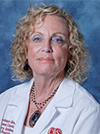 There are days when you think, “How can I get through tomorrow?” But then I walk into this office, and I look around at the patients, and I think to myself, “This is what it’s all about, being able to help other people.”
There are days when you think, “How can I get through tomorrow?” But then I walk into this office, and I look around at the patients, and I think to myself, “This is what it’s all about, being able to help other people.”
—Sherry Goldman, Breast Center, Cedars Sinai Medical Center in Los Angeles
 To be an active listener means to quiet and center yourself, to be very open. It’s your body language. It’s shutting up… You have to be comfortable with silence. You have to ignore your phone.”
To be an active listener means to quiet and center yourself, to be very open. It’s your body language. It’s shutting up… You have to be comfortable with silence. You have to ignore your phone.”
—Lisa Bradshaw, Visiting nurse specializing in hospice/palliative care, North Shore Massachusetts
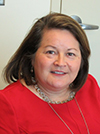 We’re going to be here with you, through thick and thin… Call us, send us an email, text us, whatever. And I think that reassurance really does go a long way [for patients]. Because we’re human, we show empathy.”
We’re going to be here with you, through thick and thin… Call us, send us an email, text us, whatever. And I think that reassurance really does go a long way [for patients]. Because we’re human, we show empathy.”
—Sylvia Estrada, Women’s Heath Care Nurse Practitioner, Cedars Sinai Medical Center in Los Angeles
Connecting to the unique, whole person being cared for
Nurse Jonathan Bartels describes the challenge of reaching extra deeply for compassion in treating patients, especially when the Emergency Room in Charlottesville at the University of Virginia “boils over” with trauma after trauma.
“Every time you look up, it’s like someone hits you with a two by four.” He relates the moving tale of how he and a colleague revitalized a patient from a trailer park who came in “rotting from the inside out.” He also discusses a practice known as The Pause, when medical staff observes a brief silence to honor the person they have toiled to save, but whom fate carried away.

John Makaransky, professor of Buddhist studies, Boston College
Then Paulette Manon, a long-time oncology nurse and nurse educator in Boston, discusses how nurses are sometimes called to provide spiritual support in spontaneous interactions with patients facing life-threatening illness. We also hear reflections on observing the human mystery ever-present in health care. John Makransky, a theologian and professor of Buddhist studies at Boston College, describes the nature of compassion (whose root meaning is to suffer with someone), which at times can trigger difficult feelings in health care providers themselves. Lisa Marr, a physician in Albuquerque, comments on how to untangle all this, based on her provocative essay “Can Compassion Fatigue?”
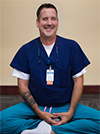 I learn how close we all are to being in that [hospital] bed. How close we all are to being a trauma patient… And if I can, then I need to treat them the way I want to be treated.”
I learn how close we all are to being in that [hospital] bed. How close we all are to being a trauma patient… And if I can, then I need to treat them the way I want to be treated.”
—Jonathan Bartels, trauma and palliative nurse, Univ. of Virginia Medical Ctr.
 Even patients that say that they’re not religious, or spiritual, frequently you see when something is devastating, they begin to question the meaning of this whole existence. And, again, they want someone to listen to them.”
Even patients that say that they’re not religious, or spiritual, frequently you see when something is devastating, they begin to question the meaning of this whole existence. And, again, they want someone to listen to them.”
—Paulette Manon, oncology nurse, Brigham and Women’s Hospital, Boston
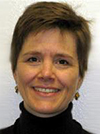 This idea like, I have to fix everything—that’s putting you on the path to burnout, in a sense, like, ‘I have to control and fix everything,’ because we can’t.”
This idea like, I have to fix everything—that’s putting you on the path to burnout, in a sense, like, ‘I have to control and fix everything,’ because we can’t.”
—Lisa Marr, MD, Professor of internal medicine, Univ. of New Mexico, Albuquerque
This program is supported by the Compassionate Care Initiative at the University of Virginia School of Nursing.